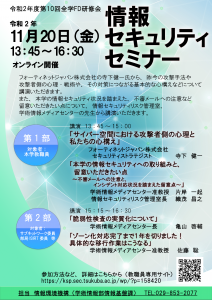Keisuke Kameyama
Director of Academic computing & communications center
Masayuki Orimo
Leader of Information Security Incident Response Team & Information security risk manager
Support for Adobe Flash Player will end on December 31, 2020.
https://www.adobe.com/products/flashplayer/end-of-life.html
Flash Player is a web browser add-in software that enables dynamic display.
After December 31, 2020, support will end and it will not be updated.
If you continue to use it, security problems will occur, so please be sure to do the following during December.
Please make sure that the viewers cannot access Flash contents by deleting them or moving them to restricted directories.
If necessary, please consider converting the contents to alternative formats such as HTML5.
Do the following depending on your web browser:
- Disable Flash Player on Microsoft Edge and Google Chrome
Edge: Access [Menu]> [Settings]> [Search Settings] and enter “flash”, and set to [Always block Flash].
Chrome: Access [Menu]>[Settings]>[Search settings] and enter “flash”, and set to [Block the execution of Flash on the site]. - Uninstall Flash Player on Windows version of Microsoft IE and Mozilla Firefox
https://helpx.adobe.com/flash-player/kb/uninstall-flash-player-windows.html - Uninstall Flash Player on Mac OS version of Safari
https://helpx.adobe.com/flash-player/kb/uninstall-flash-player-mac-os.html
* If you are using any other web browser, please respond based on the information provided by the vendor.
